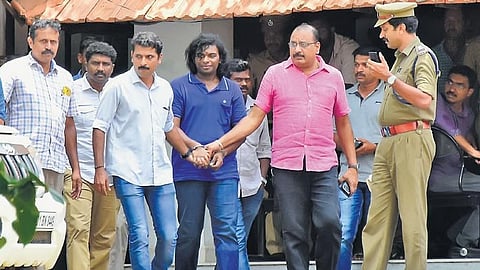

THIRUVANANTHAPURAM: The Sixth Additional Sessions Court in Thiruvananthapuram on Monday found Cadell Jeansen Raja guilty in the 2017 Nanthancode family massacre, one of Kerala’s most horrifying murder cases, bringing an eight-year-long investigation and legal battle to a close.
Cadell was found guilty of multiple charges, including murder, destruction of evidence, wrongful confinement, use of weapons, use of petrol, and arson. The motive, as established by the prosecution, was a deep-seated grudge against his parents. Medical experts testified that Raja did not suffer from any mental health disorders.
The case involves the murder of four family members. In April 2017, the bodies of Cadell‘s mother Jean Padma (58), father Raja Thangam (60), sister Caroline (26) and visually impaired relative Lalitha (70), were found in their house in Nanthancode. The police investigation revealed that the murders happened over two days, April 5 and 6. Three of the victims were found burnt, while one was found in a severely mutilated and decomposed state, infested with maggots.
Cadell Jeansen Raja, whom the police described as a loner with a troubled academic past and alleged mental health issues, was arrested a few days later at the Thampanoor railway station.
After committing the crime, Cadell fled Chennai. He had sustained burn injuries, which, police said, occurred while trying to destroy evidence by setting the bodies on fire.
The investigation revealed that Cadell had trained himself using dummy figures and sourced weapons online. He is said to have been inspired by violent video games and had even selected an axe similar to those used in such games.
According to forensic reports, the killings were methodical: each victim suffered multiple severe injuries. Lalitha had 22 wounds, Caroline 12, Jean Padma nine, and Raja Thankam suffered seven head injuries.
Police found that Cadell had disconnected CCTV cameras in the house and isolated each victim before attacking them. After killing them, he reportedly poured petrol over the bodies and set them on fire.
The initial statements by Cadell baffled police. He claimed he had committed the murders as part of an experiment in ‘astral projection’, a pseudoscientific belief in out-of-body experiences. However, this theory quickly gave way to more grounded motives. Police said Cadell harboured deep resentment toward his father, blaming him for neglect and psychological trauma.
His mental condition became a critical part of the trial. Medical evaluations in 2017 found him unfit to stand trial, diagnosing him with schizophrenia. He was sent to a psychiatric facility for treatment. But the prosecution maintained that the murders were premeditated and deliberate, pointing to the detailed planning and execution. After several follow-ups, the court deemed him fit to stand trial.
Throughout the proceedings, more than 41 witnesses testified. These included forensic experts, investigating officers, neighbours, and friends who spoke of Cadell’s isolation, erratic behaviour, and academic failures. A former classmate in Australia recalled him as socially withdrawn but obsessed with gadgets and video games.
Police also recovered a chilling handwritten journal from Cadell’s room, where he had reportedly sketched out his frustrations and fantasies. Police believe this formed the blueprint of his crime.
The trial was delayed multiple times due to the need for continued psychiatric evaluations and the COVID-19 pandemic. However, it resumed in full swing in 2023, and final arguments were heard earlier this year.
In the initial days of his remand at the Poojappura Central Jail, Cadell’s unusual conduct baffled prison staff. He appeared cheerful and claimed to be in regular communication with his deceased parents. He also told officials that he had trained for over a decade in astral projection and could speak with spirits.